By Victoria Reyna Varville, MBA ’21
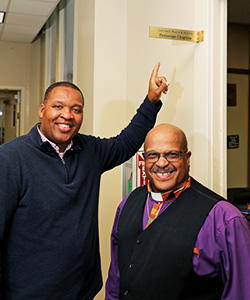 On a day that seemed just like any other in the summer of 2022, Lieutenant Colonel Bryant Casteel found himself driving to the University of the Incarnate Word. A chaplain in the U.S. Army Chaplain Corps, he felt called to UIW in search of a way to give other Army chaplains educational pastoral experiences that went beyond the walls of Brooke Army Medical Center (BAMC) as they worked towards their Clinical Pastoral Education (CPE) certification. The CPE certification is a 52-week residency course accredited by the U.S. Army Training and Doctrine Command and the Association for Clinical Pastoral Education (ACPE), that prepares clinically trained specialists in spiritual care. These training courses are intended to prepare chaplains, the spiritual heart of the Army, with classes and formation opportunities to best prepare them for the challenges they will face during their service.
On a day that seemed just like any other in the summer of 2022, Lieutenant Colonel Bryant Casteel found himself driving to the University of the Incarnate Word. A chaplain in the U.S. Army Chaplain Corps, he felt called to UIW in search of a way to give other Army chaplains educational pastoral experiences that went beyond the walls of Brooke Army Medical Center (BAMC) as they worked towards their Clinical Pastoral Education (CPE) certification. The CPE certification is a 52-week residency course accredited by the U.S. Army Training and Doctrine Command and the Association for Clinical Pastoral Education (ACPE), that prepares clinically trained specialists in spiritual care. These training courses are intended to prepare chaplains, the spiritual heart of the Army, with classes and formation opportunities to best prepare them for the challenges they will face during their service.
Casteel didn’t know much about the University beyond its proximity to JBSA-Fort Sam Houston. He, admittedly, had no plan for what he would do or who he would talk to once he arrived on campus. But he knew God did.
Casteel parked, walked up the steps to the Columkille Administration Building, turned right and wandered down the hall until he saw a plate above a door that read:
“Protestant Chaplain”
“A Protestant chaplain at a Catholic University…” he thought.
His interest was piqued.
“I saw Bishop (Alexander) sitting there, and I didn’t even know who he was. I just went in, and we had a conversation.”
His decision to turn right instead of left that day led him to the office of Bishop Trevor Alexander, UIW’s beloved Protestant chaplain and adjunct faculty member. The two strangers soon felt like lifelong friends as they connected over their respective military backgrounds, their faith and more.
Though they didn’t know it at the time, that conversation was the beginning of what would become a partnership between UIW and the U.S. Army Chaplain Corps at JBSA-Fort Sam Houston. Casteel left Alexander’s office that day feeling positive about the possibility of working with the University to help the Army chaplains learn and grow during the year of their CPE certification residency. This residency period is a time for CPE candidates to engage in hands-on, real-world situations using what they have learned during their course. What Casteel didn’t realize was that almost as soon as he left the room, so did Alexander, who went straight to the office of Sr. Walter Maher, CCVI, vice president of Mission and Ministry.
“I wasn’t aware if they were going to take it on,” Casteel said as he looked back on his initial pitch to work together. “But Bishop (Alexander) just took to it. He said, ‘I like this idea.’ And I didn’t know this conversation happened, but he went to Sr. Walter, and Mission and Ministry took it on.”
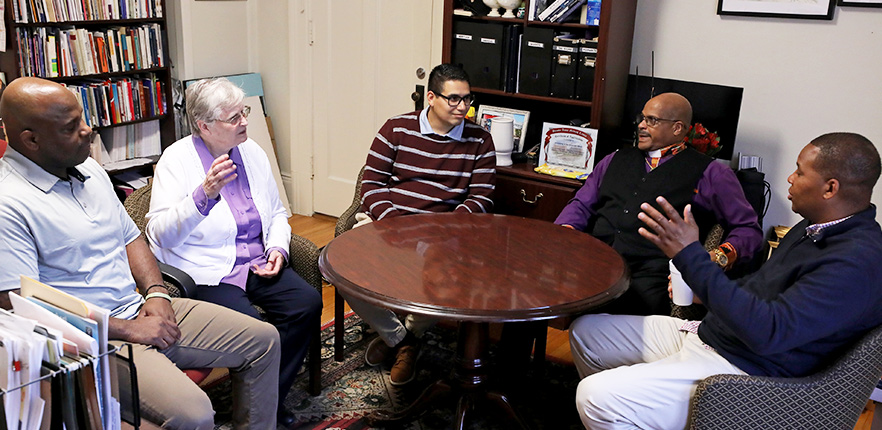
Sr. Walter remembers the moment well. She and Alexander got straight to work mapping out the details of what a collaboration could and should look like. To her, the choice to say “yes” to the opportunity was hardly a choice at all. It was an intrinsic step forward in UIW’s path, paved by the transformative “yeses” of the Sisters of Charity of the Incarnate Word for more than a century.
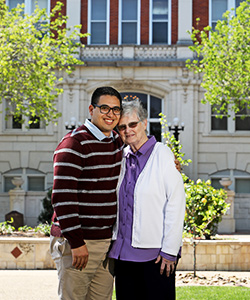 “The Sisters went where they needed to go,” Sr. Walter explained of the University’s founding Congregation. She shared that in the late 1800s, as the railroad industry expanded, the Sisters established and staffed hospitals along the nearest railroad’s route to meet the growing need for healthcare in those areas. When the road is uncertain – as it was for the founding Sisters – Sr. Walter knows to look to their example of faith.
“The Sisters went where they needed to go,” Sr. Walter explained of the University’s founding Congregation. She shared that in the late 1800s, as the railroad industry expanded, the Sisters established and staffed hospitals along the nearest railroad’s route to meet the growing need for healthcare in those areas. When the road is uncertain – as it was for the founding Sisters – Sr. Walter knows to look to their example of faith.
“Maybe the best way to say it is that God is already there ahead of us,” she said. “And because God is there waiting for us, then how do we see where God is and how do we respond to that? [Chaplain Casteel] was somebody coming into this University, not having any idea about anything we do. And yet, there was an invitation from God for us to say, ‘Is this possible?’ And if it's possible, why not say yes?”
“From the first day we got there, it was transformative because of the acceptance,” said Casteel. “It's one thing for a school to say, ‘we are military friendly,’ because San Antonio is full of military bases. It's another thing for there to be a backing and action and literal support of the military. My experience with UIW wasn't just them saying, ‘oh, we're military friendly.’ It was, ‘we care for the military. We believe in what you do. And we're willing to invest in you as chaplains in your educational journeys.’”
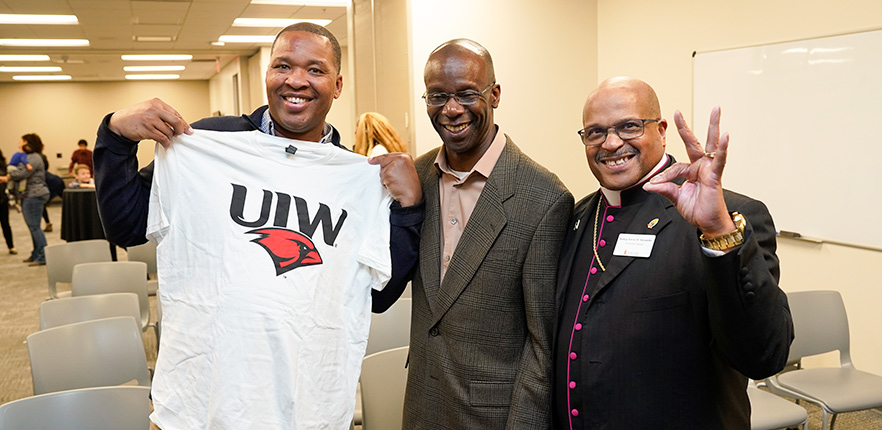
After more meetings and thorough planning sessions, including conversations with Chaplain (Colonel) Mark Lee, director of the CPE program at the Brooke Army Medical Center, to detail what the chaplains' training at UIW would entail, the University demonstrated support by signing a Memorandum of Understanding with the U.S. Army Chaplain Corps at JBSA-Fort Sam Houston. The U.S. Army Chaplain Corps is the military unit that provides religious support, counseling, and guidance for U.S. Army service members. Under the agreement, Army chaplains of all religious backgrounds and denominations stationed at JBSA-Fort Sam Houston would come to the University to learn from its faculty, students and even one another to fulfill their CPE certification requirements.
“We were looking at what it means to be a chaplain in today’s society,” explained Alexander. “When you hear the word chaplain, what does that mean? We explored that together.”
The chaplains sat for lectures across a range of topics, all centered on the role of a chaplain, both in and out of the armed forces. They were even joined at one training on campus by Chaplain (Colonel) Ibraheem Raheem, program director of the School for Spiritual Care and CPE at the U.S. Army Institute for Religious Leadership Graduate School in Fort Jackson, SC. Together with UIW faculty, they explored topics including “The Chaplain in a Multicultural Setting,” “The Chaplain as a Civic Leader,” and even “Chaplains at Play,” which focused on how they can strike the balance between caring for others and finding moments of much-needed levity for themselves. In these lectures, they heard and learned from Sr. Walter, Dr. Arturo Chavez, associate vice president for Mission and Ministry, Dr. Javier Clavere, dean of the College of Humanities Arts and Social Sciences, Bishop Alexander and more. After each session, the chaplains would gather in a room with Casteel – whose role as discussion leader was simultaneously contributing to his own ACPE Certified Educator requirements, a certification that would qualify him to teach other chaplains – to share and explore what they had just learned, and how they could use it to better their work in their own vocations of serving others.
As the program grew, so did its offerings. The “students” became the teachers as the chaplains were eventually offered the opportunity – or challenge, some would say – to share their own presentations about topics ranging from faith to multiculturalism to social justice with UIW students, in preparation for the work they will do as CPE certified chaplains. In rooms full of their colleagues, strangers and students – all of whom represented different religions, cultures, ethnicities and walks of life – the chaplains were tasked with sharing their insights, knowledge, and ideas. These interactions were welcomed by both chaplains and students as opportunities to experience and embrace diversity of thought, strengthening their own faith and convictions.
“One of the chaplains said, ‘When I put this presentation together, I felt good. When I started presenting it and got questions, I had to stop to think’,” recalled Alexander of a conversation he shared with a chaplain after a presentation delivered to students. Alexander remembered what he said to the chaplain next.
“You were stunned. And you didn’t know what to do. You felt inadequate … That’s good. That’s how we grow in our faith. It’s okay not to have the answer, but to be able to say, ‘I don’t have the answer right now, I have to do more research on that’ … that’s where we grow.”
That growth happening at UIW, Casteel hopes, is what will prepare the chaplains, who have answered the call to serve members of the U.S. Army, to provide support and counseling in what may be some of their darkest days. It’s a challenge he is familiar with.
“We lost our first guys on the Fourth of July,” shared Casteel about his own deployment to Iraq as a U.S. Army chaplain. “I remember like yesterday a couple of my soldiers came up to me and said, ‘Chaplain, we have a fallen angel … the commander needs you.’”
“I knew we were at war,” he continued. “But there was something on that day that just hit me. It was an awakening for me about the cost of war.”
In another pivotal moment, Casteel was delivering an Easter sunrise service while deployed, when suddenly, one word was heard by everyone in the chapel:
Incoming. Incoming. Incoming.
From within the walls of the chapel, service attendees could feel the vibrations of a rocket that struck nearby. The soldiers ran to the nearby bunker. Once they received the “all clear,” the service resumed as quickly as it had stopped. Casteel continued serving and preaching, this time with an even deeper level of gratitude for the lives of those who had gathered to praise and worship, and with a clearer understanding of the importance of his role in their lives as a spiritual leader.
Now in his time at UIW, Casteel sees the young men and women in the U.S. Army in the eyes of UIW’s students who listen to the chaplains on campus, asking questions and searching for answers of faith.
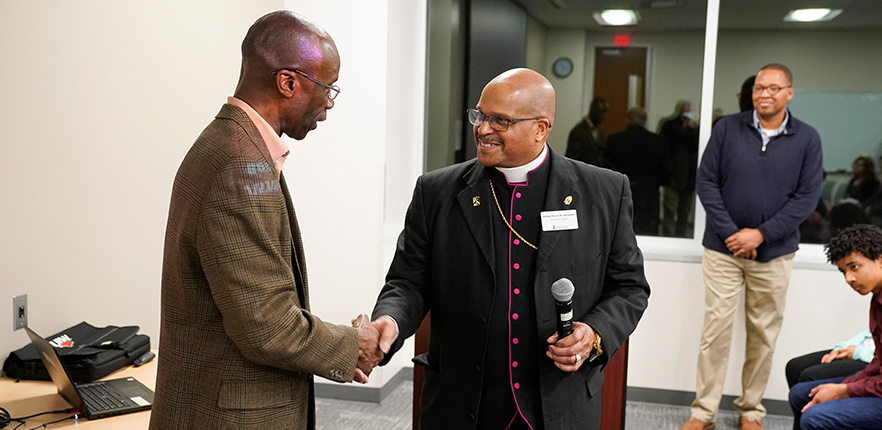
“You think about your average NCO (non-commissioned officer) or soldier, they're coming right out of college. Your young officers, they're coming out of this age bracket,” he explained of the value of giving chaplains the opportunity to connect with University students.
Now in the second year since signing the MOU, the mutually beneficial relationship between the U.S. Army Chaplain Corps and UIW has continued to grow. In addition to welcoming a new cohort of CPE trainees to campus for lectures and learning opportunities, the University also opened its doors for two chaplains to complete their certification residency hours by directly supporting
UIW’s students. Chaplain (Captain) Anthony Moya is completing his residency hours in UIW’s Behavioral Health Services Department, while Chaplain (Captain) Asnage Castelly is providing mentorship for UIW’s student-athletes. The two agree that though their time at UIW was unexpected, the experience has been life changing.
“I thought we were going to be at Brooke Army Medical Center,” shared Moya. “When they presented this opportunity, I felt excited because we had already had some classes and presented at UIW. It’s helped me grow – people at UIW have that desire to help you grow. I’ve grown in my ministry and in my understanding of how to help others.”
“Being at UIW, that 18-to-25 age group population is a reflection truly of what we face in the military,” added Castelly.
The young adults who Moya, Castelly and the other chaplains have worked with have also benefited from the program, shared Alexander. Having the chaplains on campus has helped the students expand their worldview, learn how to engage in respectful dialogue about sometimes polarizing issues, and how to see others as fellow brothers and sisters, regardless of their faith backgrounds.
“I think that's very much part of our Catholic identity,” shared Sr. Walter when asked about the benefits of an exposure to various faith traditions. “It is really about having a strong understanding of who we are as a Catholic institution, which embraces interfaith and ecumenical dialogue. That's very much part of our identity, very strongly attested to by Pope John Paul II and by Pope Francis. You see them all the time engaging with all the different faith traditions. So that's just part of our identity.”
“The students summed it up best,” Alexander shared about the feedback he’s received from UIW students who have met with the chaplains since the launch of the program. “They got exposure to other voices.”
“One of the textbooks we use in class is Fratelli tutti, which is Pope Francis’s encyclical,” Alexander explained further. “In one of the chapters, he says, ‘in order for us to not treat people as the ‘other,’ we have to open wide our hearts’ … these are the skills that we have to constantly work on as a society. As chaplains, you’re not just a chaplain to one denomination, you’re chaplain to everybody in your unit. I’m a chaplain for the entire University community. If we can apply that same concept to society …”
His voice trailed off with a smile as he envisioned the world that could be if people learned to do what the chaplains and UIW community have been doing for the last two years – looking past differences and finding connection with one another. He – and all involved in the program – view the program’s creation not only as a worthwhile endeavor for good, but as a natural, almost inevitable part of UIW’s story.
“UIW is unique in terms of their innovation … the three Sisters who came here, they always innovated,” reflected Castelly of the founding Sisters of Charity of the Incarnate Word. “UIW is still thinking outside the box in taking this chance to work with the military (chaplains). They come from a Catholic perspective and mission, but everyone, regardless of their faith tradition, is loved and accepted here. It all goes back to those three wonderful Sisters who answered the call to serve.”
The call to serve is one that resonates with every member of both the UIW community and the U.S. Army Chaplain Corps. And the innovation occurring at UIW in bringing Army chaplains to an institution of higher education to teach and learn from its faculty and students, is something that has even caught the attention of Army leadership at the Pentagon.
In January of 2024, a room full of people gathered on campus to celebrate Chaplain Casteel for his completion of the ACPE Certified Educator Candidate course. Chaplain Major General William Green Jr., U.S. Army chief of chaplains, accepted an invitation to join in the celebration, held on the UIW Broadway campus.
“I wanted to do my graduation gathering here,” Casteel shared of his decision to celebrate the completion of his certification on the UIW campus. “This place has shaped me. When I walked into this building a couple of years ago, I just pulled up to the University and I didn’t know anybody. But you welcomed me in. That’s how God did this, and the University just embraced it. UIW has truly lived out its Mission.”
In addition to Casteel and Green, those in attendance included Bishop Alexander, Sr. Walter, Castelly, Moya, Dr. Javier Clavere and more members of the UIW community and U.S. Army chaplains who have all taken part in the CPE journey at UIW. All listened intently and excitedly as Green, the esteemed two-star general, addressed the crowd.
“Something has happened here,” Green said of what he learned about UIW’s work with the Army chaplains. “I want to say to this institution, thank you for having open arms. Everything I’ve heard here is just exciting. What has happened here is an example of what we say to our soldiers and our leaders about thriving in complex situations … and it must start somewhere.”
“As I look here, I think what you’ve been able to do is carve out a niche that’s different than any other CPE program,” he said to Casteel during his remarks. “You drove up here at UIW and you walked into something different.”
UIW’s history has been paved by people working tirelessly to make a difference. The creation of historic, innovative, and lasting programs that address current needs, with a spirit of service and open heartedness is deeply rooted in the story of the University. The CPE program is no exception, as it addresses and serves each of the University of the Incarnate Word’s core values: Education, Truth, Faith, Service and Innovation.
“This story has to be told,” Green remarked as he shared what he believes will be long-term benefits for the U.S. Army Chaplain Corps as the result of what UIW and the Army chaplains of JBSA-Fort Sam Houston began. “Army CPE will learn from what you did here. And it will change the way we look at it.”
“When you receive the call,” Green concluded, “and to me there is nothing more important than that, it is an opportunity to go out and do what God would have you do.”
From the U.S. Army chaplains to Bishop Alexander, Sr. Walter and the entire University community – guided by faith and the example of the founding Sisters of Charity of the Incarnate Word – the call was answered with a resounding “yes.”


